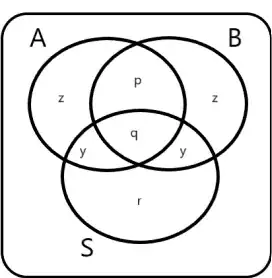Let $A, B$ be independent events, and assume we also know the probabilities $P(A\mid S)=P(B\mid S)=c_{is}$, and of $P(A\mid \bar S)=P(B\mid \bar S)=c_{i\bar s}$ and $P(S)=c_s$.
how would we find $P(A,B\mid S)$ ?
My idea was to rewrite $P(A,B | S)= P(A | S,B) P(B|S)$, and then $P(A | S,B)=P(A|S)$... however, my last equality is not true.
